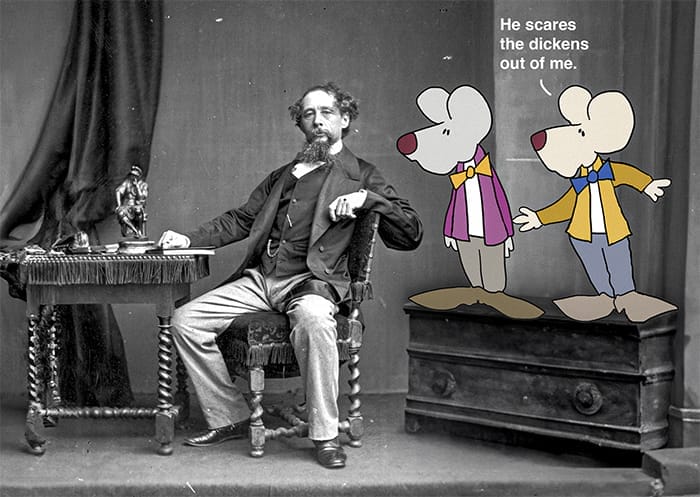Have you ever noticed that those “creative types” can sometimes be quirky? If you are laughing because I am the pot, calling the kettle black, I understand. Guilty as charged. But I’m on the low end of the creative scale, so my “quirks” are down there with me, maybe.
Anyway. The “heavy hitters” in the creative world tend to be a little unconventional at times. Off-center, perhaps.
One of the people who comes to mind is Charles Dickens. He rose from a horrible childhood and became the most popular novelist of his day. And 200 years later, we still celebrate his work.
He was a bit complicated. He wasn’t some old prude dude as we might expect. Nope. He had a thing for the ladies. Dickens reportedly cheated on his own wife with multiple women, possibly even her sister. His own marriage eventually ended in a spectacularly public failure. And he didn’t give much attention to his children, especially as they aged.
Anyway. He was one big, quirky kind of guy.
For one thing, he preserved his dead pets through taxidermy. Seriously. He practiced those taxidermy skills on his very own pets in his very own home. And. This is beyond me.
One such example was his pet raven named Grip. He stuffed his pal, big as you please. And Grip can still be found at the Free Library of Philadelphia. In a slightly more morbid fashion, he also stuffed the paw of his favorite cat named Bob. But wait, there’s more. He affixed that paw to the end of an ivory letter opener. Don’t even ask me about Fido.
Maybe it is more of an English thing. Maybe. That’s where he was born. England. And he didn’t care one bit for America. But his duties as a famous author called him here.
Charles Dickens toured the United States twice. His first tour was in 1842, and the second in 1867.
He was not amused. In fact, he would go on to publish two books about his American travels and experiences. In them, he said Americans were crude. And, that we were “uncouth opportunists.” When he went to Washington DC, Dickens called it “head-quarters of tobacco-tinctured saliva.”
But. Despite Dickens’ animosity toward the United States, the people of that time did not care. They adored his work.
Speaking of being adored. I mentioned he had a thing for the ladies despite the fact that he was married.
First, he had an attraction for his dead sister-in-law. After Dickens married Catherine Hogarth in 1836, his young sister-in-law, Mary, moved in with them in London. But, a year later, Mary died unexpectedly in Dickens’s arms. Her death struck him, big time. He cherished her memory more than he loved his own wife. He wore Mary’s ring and took a lock of her hair.
Privately, Dickens fell out of love with his wife, even though she gave him ten children.
In 1857, the 45-year-old Dickens began an affair with 18-year-old Ellen Ternan, an actress in a play he produced. His affair with Ternan, lasting a total of 13 years. They probably had children together.
Finally, he really went all in when he humiliated his wife by publishing details about their failed marriage. When Dickens’s marriage fell apart, all sorts of rumor spread throughout London. He should have ignored them, but Dickens couldn’t resist the spotlight. He ended up publishing an article in the London Times addressing the rumors.
During the following 20 years of Catherine Dickens’ life, people said she had never recovered from the divorce.
There is a lot more about this man that runs deep. He was a member of The Ghost Club, for one. Believer or skeptic, who knows.
He was a believer and advocate of Mesmerism. Mesmerism, sometimes called animal magnetism, is an older term for a practice similar to hypnosis. It was developed in the 18th century. By a dude named Franz Anton Mesmer. Its purpose was to induce a trance-like state in people to improve their health and well-being.
I suppose we all have our own complications. None of us are perfect. Yet, it seems Dickens had his fair share of character detours. Perhaps it was the best of times. Or maybe, it was the worst of times.
And so he went.
“””””””””””
“We are all flawed creatures, all of us. Some of us think that means we should fix our flaws. But get rid of my flaws and there would be no one left.”
– Cheryl Strayed
“””””””””””””
“The only character flaws that can really destroy us are the ones we don’t admit.”
– Tim Keller
””””””””””””’
“Knowing yourself is the beginning of all wisdom.” – Maria Mitchell
”””””””””””””
Well, that sure is the dickens, Dickens.
